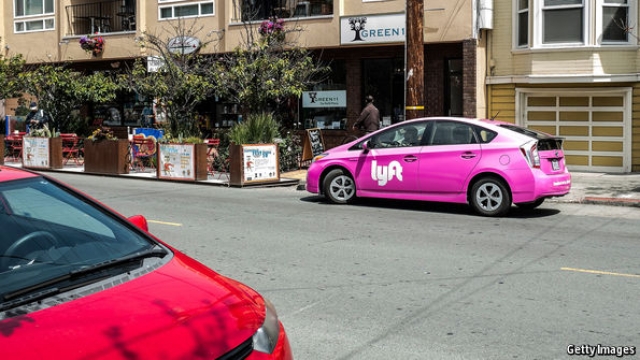Making Vehicles May Prove Easier Than Selling Services
CAR companies have long talked a good game when it comes to harnessing technology that threatens to undermine the business of making and selling vehicles. In the 1990s, as the dotcom boom was in full swing, Jac Nasser, then boss of Ford, said that the new business models the internet would enable meant that his firm would outsource the dull task of assembling cars and reinvent itself as a mobility company, selling transport as a service. Mr Nasser was too early with this insight. Only now are most big carmakers teaming up with tech firms that offer transport services, on the road to becoming mobility providers. But they in turn may have left it too late.
In the scramble to reinvent themselves, conventional carmakers have turned their attention of late to ride-hailing apps. These services allow people to use smartphone apps to summon a car and driver to ferry them to their next destination. On May 24th both Toyota and Volkswagen announced tie-ups with taxi-hailing apps. The Japanese firm has made a small, undisclosed investment in Uber, the world’s biggest ride-hailing firm, with operations in over 70 countries. VW announced an investment of $300m in Gett, an Israeli firm that is popular in Europe. Matthias Müller, VW’s boss, has much bigger aspirations. He declared that the German carmaker aims to be a world-leading mobility provider by 2025.
VW will not lack for company. In January General Motors invested $500m in Lyft, Uber’s closest rival in America, partly to embrace ride-hailing and partly to share in the development of self-driving robotaxis. Last year Mark Fields, the boss of Ford, perhaps forgetting Mr Nasser’s earlier pronouncement, said that henceforth his firm would be a mobility company as well as a carmaker. Rumours abound that Ford is planning its own ride-hailing app and a vehicle to go with it—perhaps an on-demand minibus service.
Though the latest battleground is ride-hailing, car companies have their eyes on other ways of making money from mobility. People who might hitherto have wanted to own a car may no longer do so, preferring to pay to drive when they need to. Young city-dwellers are turning their backs on owning a costly asset that sits largely unused while losing value. Membership of car clubs, which let people book vehicles by app for short periods, is growing fast. ZipCar, the world’s largest, is owned by Avis Budget, a car-hire firm. More carmakers are copying Daimler’s Car2Go and BMW’s Drive Now apps. Ford, for example, is testing car-sharing services in America, Britain, Germany and India.
Car-sharing and ride-hailing schemes may eventually make carmakers money. For mass-market firms, used to slim margins, it might even prove a boon, though premium carmakers, used to fatter profits, may not agree. Carmakers will not only take a cut of the fares but will jostle to supply vehicles. Indeed Toyota’s deal includes a financing scheme for Uber drivers to acquire its cars. GM offers a similar scheme to help Lyft’s drivers get on the road.
But their chances of profiting from usership rather than ownership depend on two things. First, carmakers need to change how they operate. Mastering the complicated business of manufacturing cars has kept new competitors largely at bay. But simultaneously running a service business that depends on constant engagement with customers and crunching large quantities of data is a far cry from designing a new SUV. Indeed the flurry of investments by carmakers has been driven as much by the desire to learn how these new businesses work as for immediate profits.
Second, big tech firms, adept at handling data and selling services, cannot get too far ahead. Google leads the field in self-driving vehicles. Apple is rumoured to be planning to build its own car and recently invested in Didi Chuxing, China’s answer to Uber. A host of startups are plotting ways to profit from offering services that will move customers from A to B.
Instead of owning a car, the future could include a monthly subscription to an app that combines car-sharing, taxis, buses, trains, bicycles and anything else on wheels, including on single journeys where multiple modes of transport are the quickest or cheapest option. More efficient use of public transport, more car-sharing and more ride-hailing will mean that people who might have bought a car may no longer do so, stifling the growth in vehicle sales that was expected as the middle classes take to the roads in developing countries. Carmakers face selling fewer vehicles while freewheeling competitors, unencumbered by a vast manufacturing business, mop up the profits from selling transport to customers on the move.
Click HERE for the original article.

